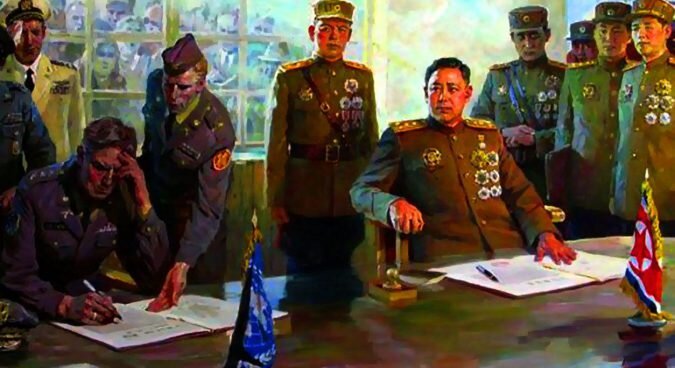68th Anniversary of the end of the Korean War
The signing of the armistice to end hostilities in Korea, 27th July 1953.
The official North Korean version of the Armistice signing, as painted by a North Korean artist working in the mandatory ‘socialist realist’ style copied from the Soviet Union. Looks like victory, doesn’t it?
Today, 27th July, is the sixty-eighth anniversary of the end of the Korean War, which didn’t officially end at all. Only an armistice was signed sixty-eight years ago. So technically, the war is still going on, only in suspended animation. That’s definitely sometimes how it feels here, next to the DMZ. It’s as if both sides have been holding their breath ever since 1953, meanwhile building defenses and going about their other business. As is obvious, ‘business’ has on the whole been better for the Korea south of the DMZ than the one north of it.
The War lasted from 25th June 1950 to 27th July 1953. Less than two months after the North Korean invasion, their army controlled most of the Korean peninsula, and the Republic of Korea and US forces defended only a perimeter around the south-eastern port of Pusan. But in autumn 1950, the U.S.-led United Nations counteroffensive pushed back the North Korean army all the way up to near the Chinese border. It was at this point that the recently triumphant Chinese Communist party came to its neighbor’s aid by sending thousands of ‘volunteers’ to fight. The Chinese counteroffensive devastated the UN advance, and retook Seoul. After that, the War became a bloody stalemate lasting another two and a half years..
But the key player was Josef Stalin. Research in Soviet archives done during the brief period in the early 1990s when Yeltsin let scholars and journalist consult them, and before Putin slammed the door shut again, show conclusively that by early 1952 Stalin, who had green-lighted his protege, Kim Il Sung’s, invasion, had already decided the war couldn’t be won, but also that it couldn’t afford to be lost either. Peace had to be delayed in order to divert attention., and he deliberately made sure that the Armistice negotiations out for over more than two years, making the Chinese and North Koreans comply with his strategy. In fact, the North Koreans themselves didn’t seem to have much say in how the war was waged. Everything was decided by Stalin, and by Mao, after China joined the conflict.
A platoon from the 1st Battalion, The Black Watch, pose for the camera before going out on patrol in 1952.
Stalin was looking at the bigger picture. He wanted to keep the US and her allies pinned down in East Asia in order to give the communist powers in Europe the chance to re-arm and consolidate themselves. The war was essentially a ‘diversion’. Korea became a place where he could distract the US and her allies, using huge amounts of Chinese manpower and a few of his own MIG15 pilots. Ironically, it was North Korea, Soviet’s ally, that took the brunt of it all: the end of the War, 80% of all its buildings were destroyed. The phrase ‘bombing back to the Stone Age’ should first be applied to North Korea. But Mao also benefited. He lost an a lot of ‘volunteers’ in the fighting, but was flexing his muscles. The Korean War gave the new ‘emperor’ of China an opportunity to scare his neighbours, especially Nationalist Formosa, or Taiwan, as it now is known. He also got to modernise his army. At the end of the War, the Chinese military was infinitely more effective than at the start.
Up there, beyond the DMZ, they say they won the War. It’s called the Fatherland Liberation War. They also say that the South invaded the North. Which means that one must assume that the people of North Korea are today celebrating a war which they believe was an invasion that they repulsed and that became a heroic and triumphant war of liberation. The truth, of course, is very different. But not simply the opposite of the rhetoric deployed by the government of North Korea. In some senses, the South did coax the North into conflict. The period from spring 1948, when the two Koreas officially came into existence up to the outbreak of hostilities was characterized in the the South by widescale persecution of anyone who showed sympathy for the DPRK. On Jeju island, which lies off the south coast of the peninsula as its now known as ‘Honeymoon island’, between April 1948 and May 1949, somewhere between 14,000 and 30,000 people (10% of Jeju's population) were killed, and 40,000 fled to Japan. In some ways, this was the true beginning of the Korean War.
In today’s ‘Korea Herald’ it was announced that a conference of Korean War veterans will be held in Pyongyang, despite the Covid-29 epidemic, of which, so they officially say, there are zero cases. No one outside North Korea believes this, but one of the problems with consistently lying is that even if you decide to tell the truth no one will believe you. Perhaps the draconian measures they’ve taken have indeed kept out the virus. But at what price? Meanwhile, the economy is imploding and the people are starving to death. Yesterday in the same newspaper it was reported that more foreigners have left the country because of the severe restrictions, which means there are now hardly any non-North Koreans remaining in the DPRK. Sometimes I fear that a Jonestown-style mass suicide is in the offing. It isn’t so implausible. After all, the people are so wholly enmeshed within the bizarre alternative reality manufactured by the Party that they may very well willingly follow orders that require them to make the ultimate sacrifice.


